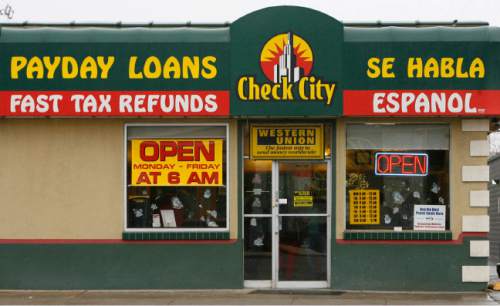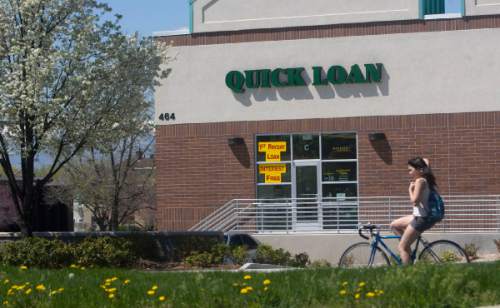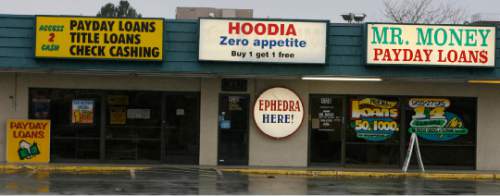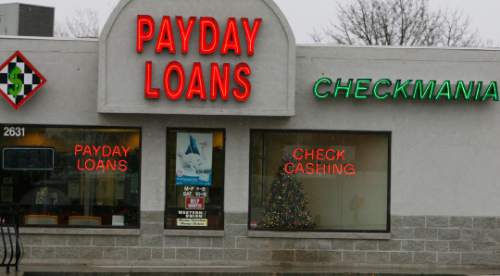This is an archived article that was published on sltrib.com in 2015, and information in the article may be outdated. It is provided only for personal research purposes and may not be reprinted.
Herman Diaz of South Salt Lake borrowed his first payday loan — at about 500 percent annual interest — because he needed $300 to repair his car.
That mushroomed, he says, into nearly $10,000 of debt, ultimately forcing him into bankruptcy.
How?
Mostly, he took out more and bigger loans to pay off earlier ones as they came due. Some lenders charged up to 750 percent interest. (The average payday loan in Utah last year carried a 482 percent rate.) He once had eight loans out at the same time, trying to buy time against default.
Payday lenders encouraged him, he says, and threatened lawsuits, or even arrest, if he didn't do it.
All the while he fell further behind on other bills. Finally, two payday lenders — USA Cash Services and Mr. Money — sued him when he was unable to pay more, one for $666 and the other for $536. More lawsuits loomed, and he says lenders were calling demanding money "every 15 minutes. I'm not exaggerating."
Diaz heard that Utah law allows borrowers to demand an interest-free repayment plan, and he sought that. "They just said they would have me charged with fraud if I didn't pay."
So he sought protection by filing bankruptcy.
Court records show that 7,927 Utahns probably could empathize with Diaz. That's how many were sued by payday lenders last year, Salt Lake Tribune research shows. That's roughly equivalent to suing every resident of Park City.
This blizzard of litigation occurred even though the industry claims the vast majority of its customers can easily afford its product. And it likes to point out that Utah law allows borrowers who do get in over their heads to demand a 60-day, interest-free payback plan.
But the crush of lawsuits "puts the lie to the notion that people pay back these loans on time, and without excessive penalties and interest," says state Rep. Brad Daw, R-Orem, who has sponsored numerous bills seeking to reform the industry.
Daw says he and his allies have watched the number of payday-lender lawsuits for several years, and says they have remained fairly constant. That, he says, suggests reforms in recent years by the Legislature have not had much effect in avoiding defaults or trapping people in unaffordable loans.
Daw's push for tougher regulation led payday lenders to funnel $100,000 in secretive donations to defeat him in 2012 (he was re-elected in 2014) with the help of embattled former Utah Attorney General John Swallow. It was among the scandals that toppled Swallow and led to charges against him and former Attorney General Mark Shurtleff.
—
Landing in court • The Tribune electronically searched Utah court records for fiscal 2015 — July 1, 2014, to June 30, 2015 — for lawsuits against borrowers filed by payday lenders registered in Utah and identified at least 7,927.
Wendy Gibson, spokeswoman for the payday-loan industry's Utah Consumer Lending Association, says that number represents a small fraction — just over 1 percent — of the 700,000 payday loans that her group estimates were made in Utah last year.
"The small number of payday-loan lawsuits," she says, "in contrast to the vast number of successful transactions, underscores that payday lenders do a remarkable job of lending responsibly."
But Nathalie Martin, a University of New Mexico law professor who has published research on payday loans, says such claims are deceptive.
"Eventually, most people fail to pay off a loan," she says. "The industry can create subterfuge around this issue by giving statistics on the number of loans that go into default, not the individual customers that default. Counting rollovers, many customers have many, many loans … and one will eventually go into default."
Payday loans usually are made initially for two weeks, or the next payday. Borrowers usually fill out a postdated check for the amount of the loan, plus interest, that can be deposited to cover it. The loan can be "rolled over" for additional two-week periods up to 10 weeks — after which interest can no longer keep accruing under Utah law.
However, critics say, lenders often threaten to deposit checks — possibly leading to big penalties for insufficient funds — or ruin a borrower's credit or sue them unless they take out other loans to pay off earlier ones.
Last year, 45,655 Utahns could not pay off their loans in the 10 weeks that they can be extended, according to a report in October by the Utah Department of Financial Institutions. And Tribune research now shows that 7,927 — about 18 percent of them — had lawsuits filed against them.
—
Payback plans • Why don't more people avoid lawsuits by taking advantage of the provision in Utah law that allows borrowers to demand a 60-day, interest-free payback plan?
Gibson says analysis by the payday lenders' association shows most lawsuits in Utah are filed against "borrowers who have never made a single payment, and thus are ineligible for the extended-payment plan." She says the plans are available only to people who have paid 10 weeks of interest on the original loan.
In contrast, Martin says that during a 2010 study, "I discovered that despite the law providing for this free plan (ours in New Mexico is similar to yours), lenders strongly discouraged customers who knew about this interest-free option by saying that the customer could never get another loan, etc."
Diaz says that happened to him.
Martin adds, "Much more critically, I found that at least in our [New Mexico] market, most lenders did not inform customers of the option, and most customers did not know about the option, even though the law required that" notification.
Gibson says that, in Utah, every borrower receives a detailed verbal disclosure of loan terms and laws, as required by state law.
Payday lenders, she says, view lawsuits as a last resort.
"Given going to court is a costly, time-consuming process for lenders and their desire to cultivate a lasting relationship with their customers, it is in lenders' best interests to offer payment arrangements" instead of suing.
—
Suit stats • Tribune research shows which payday lenders file the most lawsuits.
Money 4 You easily topped the list, filing 2,166.
Other prolific litigators included:
• Check City, 953.
• USA Cash Services, 659.
• 1st Choice Money Center, 634.
• Raincheck, 620.
The vast majority of cases, 7,553 of 7,927, were filed in justice courts.
That's a change from 2009, when a similar study showed almost all cases were filed in district courts. At that time, most payday lenders sued in whatever court was closest to their own headquarters.
That meant, for example, that people in St. George were often sued in Orem, so they did not appear to contest cases against them. The Legislature changed that in 2014, mandating filings in the jurisdiction where the consumer lives or where a loan was taken out.
"Payday lenders use justice courts because it is the most convenient and affordable forum for consumers to appear when a case is filed," says industry spokeswoman Gibson.
Daw points out, "It's also a lot cheaper to file in justice court than it is in district court."
Payday-lender suits now account for a majority of all nontraffic civil cases in 14 justice courts around the state. That includes 98.8 percent of all civil suits in the Clinton City Justice Court, 92.7 percent of them in the Kane County Justice Court and 85.8 percent in the Woods Cross Justice Court.
The Taylorsville Justice Court had 495 payday loan cases, 73 percent of all its civil cases. Marsha C. Thomas, presiding judge for that court, says that has not overloaded it, and it has been able to keep up with the caseload.
Other justice courts where payday lender suits make up the majority of civil cases are: South Ogden, Midvale, Vernal, Providence, Sevier County, Orem, Riverdale, North Logan, Davis County and West Jordan.
—
New player • The Tribune analysis found that a new breed of high-interest lender has appeared that avoids many of the regulations imposed on true payday lenders — such as the interest-free payback plans, or filing lawsuits in jurisdictions more convenient to customers.
These "signature loan" companies file even more lawsuits than payday lenders, but it's difficult to get an overall number because they fall under a broad category of "consumer lenders" that includes banks, credit unions, even tire stores.
But one signature-loan company, Mountain Loan Centers, filed 4,744 lawsuits last year — by itself more than half as many lawsuits as filed by all Utah payday lenders combined. It filed almost all its lawsuits in Provo District Court, near its headquarters.
Mountain Loan Centers' website advertises its signature loans as "better than a payday loan. Our loans are bigger! Our rates are lower!"
It is not technically a payday lender because it offers unsecured signature loans — without requiring a postdated check as a security — for longer periods than the two weeks offered by most payday loans.
Mountain Loan Centers officials did not return several calls seeking comment for this story.
Martin says she has seen something similar in New Mexico where most high-interest lenders there escape tighter regulations for payday loans by changing products a bit to escape that classification.
"Whatever law passes, they change the product to get around it," she says. "The industry knows how to get around these laws when they get passed. In many cases, [the] industry writes the laws that contain these obvious loopholes. Legislators who get campaign contributions from the industry pass the laws to keep the money coming."
Daw says he is looking at whether to pursue legislation to make such companies subject to the same sorts of regulations as payday lenders.
Of note, Mountain Loan Centers has grades of "F" from the Better Business Bureau for its offices in Orem and St. George — but has an "A" grade for its Provo office.
The company has a long list of complaints on RipoffReport.com, where customers complain interest is higher than promised and the company sues quickly if payments are missed.
The company posted a response on that website, saying: "We cannot afford to give away free money."
Meanwhile, Diaz urges caution in dealing with any high-interest lender.
"People need to know about these places," he says. "They don't make you understand that you first have to pay for the [high] interest totally, and then we get to the loan if you can pay it," adding he never managed to pay off that original principal.
"For people like us, it gets to be impossible. You're paying 400, 500 or 600 percent interest and the loan is still there," he says. "They will refuse to work with you. They say, 'You either pay the loan and the interest, or we will sue you.' "
Numbers of lawsuits by some Utah payday lenders, fiscal 2015
• Money 4 You: 2,166.
• Check City: 953.
• USA Cash Services: 659.
• 1st Choice Money Center: 634.
• Raincheck: 620.
• Speedycash.com: 357.
• Mr. Money: 345.
• Dollar Loan Center: 308.
• Fastbucks: 294.
• Chekline: 206.
Source: Salt Lake Tribune analysis of Utah court records.









